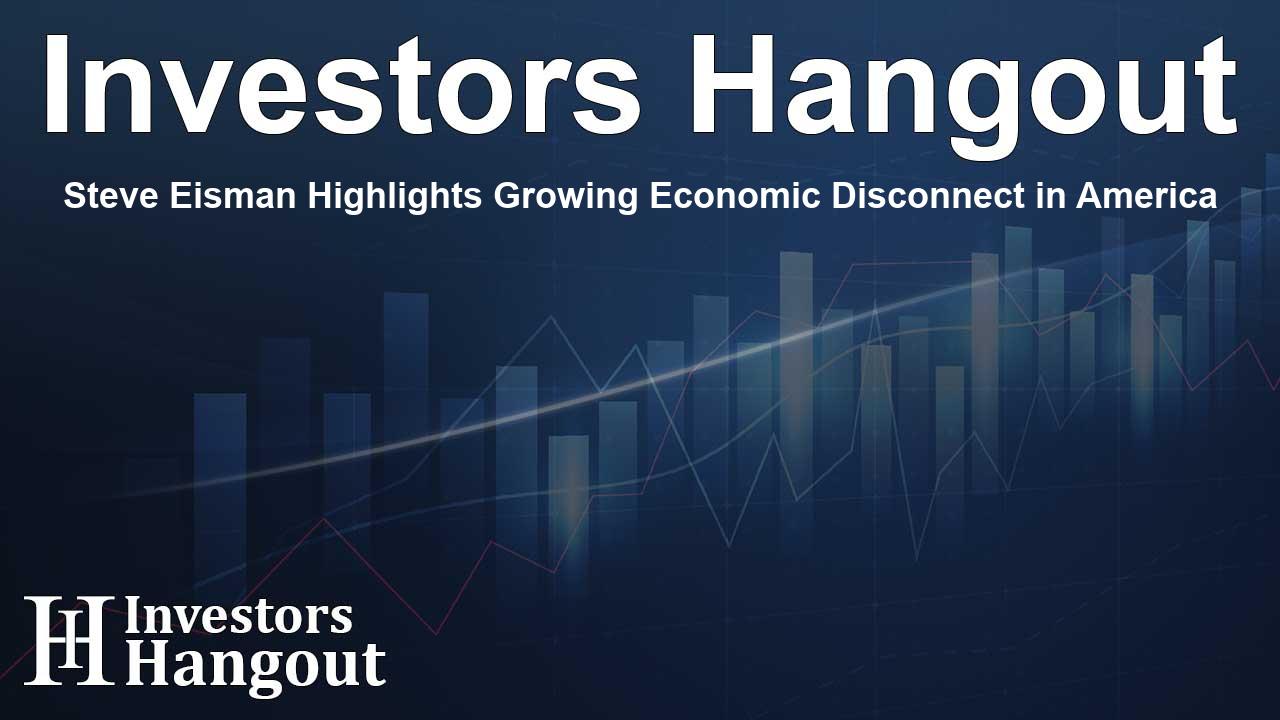Steve Eisman Highlights Growing Economic Disconnect in America

Understanding the Economic Divide
Investor Steve Eisman, famous for foreseeing the 2008 financial crisis, is raising alarms again about an unsettling trend in the U.S. economy. He emphasizes the stark contrast between the success of the tech industry and the sluggish performance of the overall economy.
The Impact of AI on GDP Growth
Recently, on The Real Eisman Playbook podcast, he discussed GDP growth figures, pointing out that a significant portion of reported growth is concentrated within large tech companies. Eisman states, “The estimated growth of 1.8% in US GDP this year is almost entirely derived from these companies,” noting their substantial investments in artificial intelligence (AI).
A Tale of Two Economies
Eisman asserts that this phenomenon represents a "tale of two economies." He explains that the robust capital expenditure in AI from tech giants contrasts sharply with the experience of workers and businesses in other sectors. The implications for everyday lives are considerable, according to Eisman.
Long-term Investment Concerns
With many investors flocking to tech stocks, Eisman maintains a cautious stance. He acknowledges that the fervor for AI investment is currently fueling positive market sentiment, but warns that this enthusiasm might not yield long-term success.
Challenges in Market Sustainability
“In the long run, companies need to generate substantial returns on their investments to validate their high valuations,” Eisman emphasized. He believes that without consistent performance, the current optimism surrounding tech stocks may be unsustainable.
Broader Economic Concerns
Economist Justin Wolfers shares similar sentiments, expressing concerns over the non-AI sectors of the economy. During a recent appearance on CNN, he highlighted that much of the economy outside the tech sector appears stagnant, suggesting we are “on the cusp of a non-AI recession.”
The Role of AI in Current Economic Trends
Wolfers explains that while the AI sector is propping up the economy, it doesn’t significantly create jobs, as data centers predominantly rely on automation. This raises questions about future employment opportunities in other sectors.
State of the Union's Economy
According to Mark Zandi, the Chief Economist at Moody's Analytics, the financial health of states varies widely; 22 states are witnessing economic shrinkage, while 16 show growth, and 13 are maintaining status quo. This disparity highlights the uneven nature of economic recovery.
Financial Pressure on Households
Zandi also points out that lower-income households are under immense pressure, operating on tight financial margins as they try to navigate costs without new job hirings. The financial well-being of these households is increasingly precarious, creating an alarming situation despite having jobs.
Conclusion
The ongoing conversation initiated by Eisman and supported by economists like Wolfers and Zandi sheds light on the complexities of the current economic landscape. It serves as a reminder that while technology may drive parts of the economy forward, a large portion of society remains in a fragile state, emphasizing the need for broader, more inclusive growth strategies.
Frequently Asked Questions
What did Steve Eisman warn about the U.S. economy?
Steve Eisman highlighted a significant disconnect between the success of large tech companies and the stagnation of the overall economy, driven largely by AI investment.
What is AI's role in the current GDP growth?
Eisman noted that nearly all of the reported 1.8% GDP growth is tied to capital expenditures in AI by major tech firms, contrasting with minimal growth in other sectors.
How does this economic situation affect employment?
Despite the boom in AI, the sector does not create many jobs, as automation dominates, raising concerns about the future of employment outside tech.
What concerns did Justin Wolfers express?
Wolfers echoed Eisman’s concerns, stating that non-AI sectors are flatlining and suggested that we might be approaching a recession outside of the AI-dependent areas.
How are lower-income households faring?
Lower-income households are struggling financially, dealing with increased costs and minimal job opportunities, creating a precarious financial environment for many.
About The Author
Contact Olivia Taylor privately here. Or send an email with ATTN: Olivia Taylor as the subject to contact@investorshangout.com.
About Investors Hangout
Investors Hangout is a leading online stock forum for financial discussion and learning, offering a wide range of free tools and resources. It draws in traders of all levels, who exchange market knowledge, investigate trading tactics, and keep an eye on industry developments in real time. Featuring financial articles, stock message boards, quotes, charts, company profiles, and live news updates. Through cooperative learning and a wealth of informational resources, it helps users from novices creating their first portfolios to experts honing their techniques. Join Investors Hangout today: https://investorshangout.com/
The content of this article is based on factual, publicly available information and does not represent legal, financial, or investment advice. Investors Hangout does not offer financial advice, and the author is not a licensed financial advisor. Consult a qualified advisor before making any financial or investment decisions based on this article. This article should not be considered advice to purchase, sell, or hold any securities or other investments. If any of the material provided here is inaccurate, please contact us for corrections.
